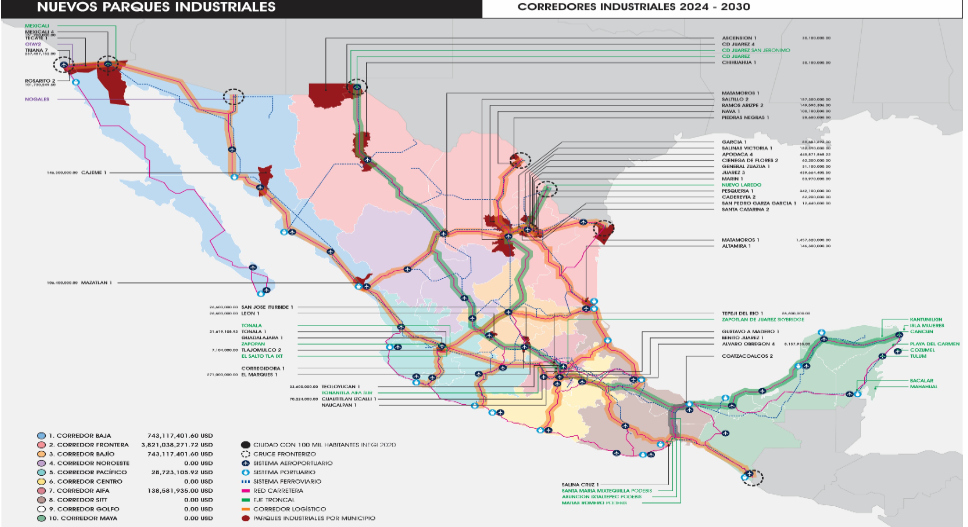The Ministry of Economy informed that the delimitation of Mexico‘s 10 industrial corridors will help bring investment.
Marcelo Ebrard, Secretary of Economy, referred that President Claudia Sheinbaum instructed the conformation of these corridors.
Mexico has an unbalanced distribution of Foreign Direct Investment (FDI), with a greater attraction in the north and center of the country.
Mexico’s 10 Industrial Corridors
“What (Sheinbaum) has asked us is: put the infrastructure in place and we will make the record of all the investments that are important so that we have, especially her on her laptop, up to date, how we are doing in investments in Mexico and what we must do for them to succeed,” said Ebrard.
These are Mexico’s industrial corridors:
Baja Corridor
States: Baja California, Baja California Sur, Sinaloa and Sonora.
Sectors: semiconductors, renewable energy, tourism, agriculture.
Border corridor
States: Chihuahua, Coahuila, Nuevo León and Tamaulipas.
Sectors: auto parts, manufacturing, agribusiness.
Bajío Corridor
States: Aguascalientes, Guanajuato, Querétaro and San Luis Potosí.
Sectors: automotive, data centers, aeronautics, tourism.
Northwest corridor
States: Durango and Zacatecas.
Sectors: mining, agribusiness, power generation.
Pacific corridor
States: Colima, Jalisco, Nayarit and Michoacán.
Sectors: agribusiness, industry 4.0, logistics, tourism.
Central Corridor
States: Guerrero, Morelos, Puebla and Tlaxcala.
Sectors: automotive, electrical-electronic, food and beverages, services.
AIFA Corridor
States: Mexico City, State of Mexico and Hidalgo.
Sectors: logistics, food and beverages, medical devices, chemical-pharmaceutical, specialized manufacturing.
CIIT Corridor
States: Oaxaca, Veracruz, and Chiapas.
Sectors: logistics, food and beverages, medical devices, pharmaceutical chemicals, specialized manufacturing.
Gulf Corridor
States: Veracruz, Tabasco, Chiapas, and Campeche.
Sectors: petrochemicals, hydrocarbons, timber, fruit, fishing.
Mayan Corridor
States: Chiapas, Tabasco, Campeche, Yucatán and Quintana Roo.
Sectors: tourism, agribusiness, renewable energy generation.
Incentives
Sheinbaum and her cabinet are expected to inherit a fiscal deficit in excess of 5% of Gross Domestic Product by the end of 2024.
The incoming administration also faces challenges that could deter foreign investment, including persistent crime and violence and water and electricity shortages.
“We’re going to try to reduce the disadvantage that the U.S. Inflation Reduction Act represents, because it has incentives that are unfair to the Free Trade Agreement. We are going to equalize, try to equalize those incentives,” Ebrard said.

